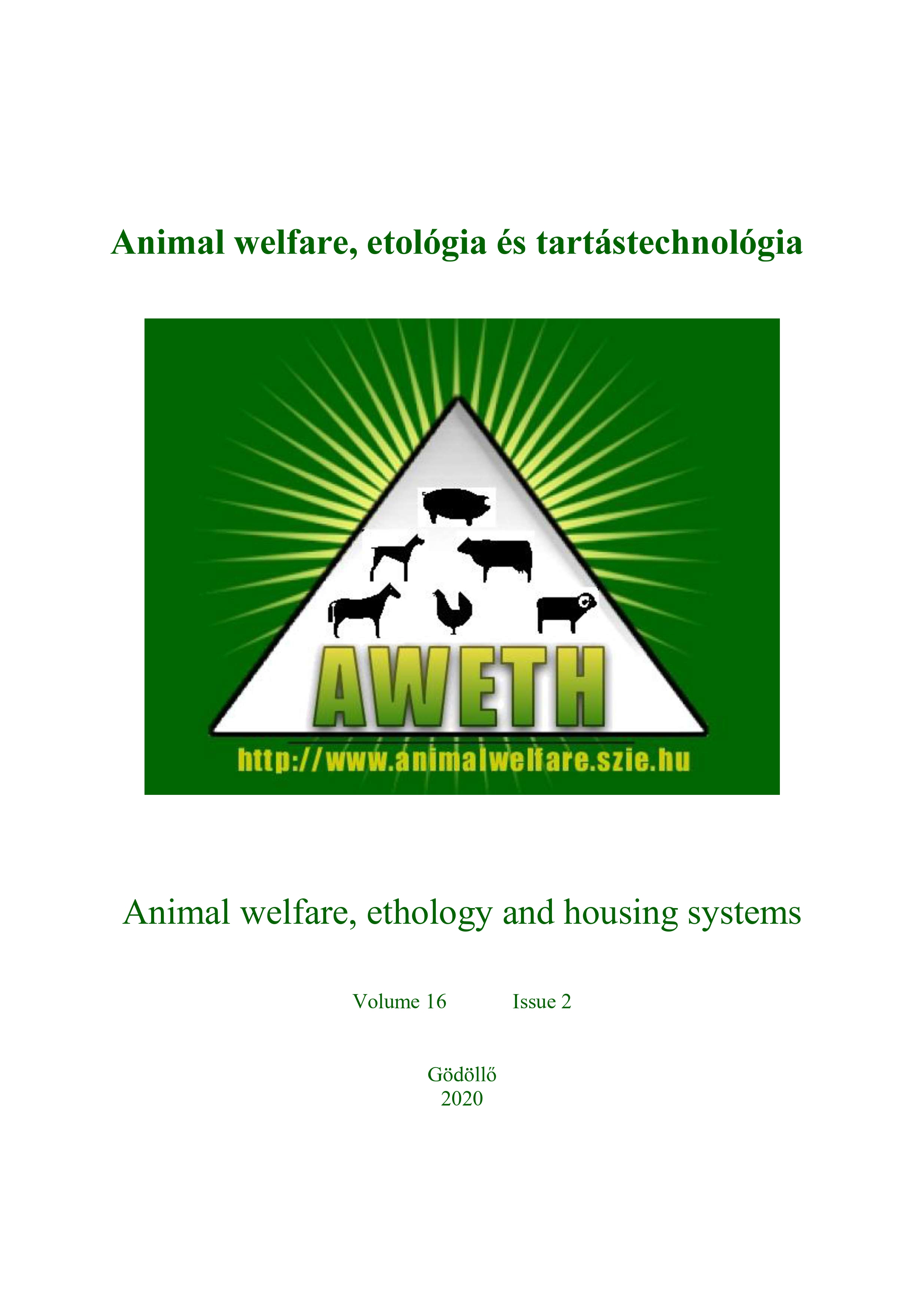Evaluation of animal-based parameters of welfare in two Hungarian dairy farms using principal component analysis
DOI:
https://doi.org/10.17205/SZIE.AWETH.2020.2.177Schlagwörter:
Holstein Friesian cow, HRV parameters, milk production, body conditionAbstract
The aim of this study was to give information about the characterization of parameters of heart rate variability (HRV) and some traditional parameters on two Holstein Friesian farms (farm 1, farm 2). Both were small-scale farms. The average daily milk yield, body condition of the animals, locomotion and temperament tests and cardiac activity measurements were made in autumn 2013. The physical activity of the animals was also recorded (lying, lying and ruminating, standing, standing and ruminating, feeding). Principal component analysis (PCA) was performed using the SPSS 20 (SPSS Inc., Chicago, IL) statistical software. Rotation of factors was done by the Oblimin method. The latent variables were calculated from the correlation matrix of the parameters. In the interpretation of PCs, only loadings greater than 0.6 were considered practically significant. The daily milk yield of cows was 25.5±4.41 kg and 23.5±8.29 kg on farm 1 and 2, respectively. Means for body condition score, temperament, heart rate, RMSSD, HF, LF/HF were recorded: farm 1: 3.1 score; 1.3 score; 73.42 beat/min; 14.19 ms; 23.52; 9.95 ratio; and farm 2: 2.7 score; 1.7 score; 74.05 beat/min; 18.75 ms; 28.53; 6.47 ratio respectively. Parameters recorded for the two farms were similar. On farm 1, the following four significant PCs (explain together over 80% of the total variance) were involved in the analysis: traits of HRV (1), body condition-temperament score (2), daily milk production (3), RMSDD (4). The first principal component (36.0% of total variance) can be interpreted as a linear combination of HF, HR and LF/HF examined parameters. On farm 2, the following four principal components (explain together 81.2% of the total variance) were defined: traits of HRV (1), body condition and daily milk production (2), temperament (3), RMSDD (4). The first principal component in the case of farm 2 corresponds to a group of three parameters: LF/HF, HF and HR. This principal component explained 29.5% of the all variance.
Literaturhinweise
Boiligon, A. A., Vicente, I. S., Vaz, R. Z., Campos, G. S., Souza, F. R. P., Carvalheiro, R., Albuquerque, L. G. (2016): Principal component analysis of breeding values for growth and reproductive traits and genetic association with adult size in beef cattle. Journal of Animal Science, 94. 12. 5014–5022. https://doi.org/10.2527/jas.2016-0737
Boivin, X., Le Neindre, P., Garel, J. P., Chupin, J. M. (1994): Influence of breed and rearing management on cattle reactions during human handling. Applied Animal Behaviour Science, 39. 115–122. https://doi.org/10.1016/0168-1591(94)90131-7
Boivin, X., Garel, J. P., Mante, A., Le Neindre, P. (1998): Beef calves react differently to different handlers according to the test situation and their previous interactions with their caretaker. Applied Animal Behaviour Science, 55. 245–257. https://doi.org/10.1016/S0168-1591(97)00050-6
Burrow, H. M. (1997): Measurements of temperament and their relationships with performance traits of beef cattle. Animal Breeding Abstract, 65. 7. 477–495.
Burrow, H. M., Corbet, N. J. (2000): Genetic and environmental factors affecting temperament of zebu and zebu-derived beef cattle grazed at pasture in the tropics. Aust. J. Agric. Res., 51. 155–162. https://doi.org/10.1071/AR99053
Castano, D. P., Sardinha, L. A., Maiorano, A. M., Venturini, G. C., Nogueira, C. S., Ospina, A. M. T., Zadra, L. E. L. F., Silva, J. A. V. (2013): Principal components analysis for productive and reproductive traits of Holstein cattle. Proceeding of International Meeting of Advances in Animal Science, 45139.
Czakó, J. (1978): Behavior of farm animals. Mezőgazda Kiadó, Bp. 13–84.
ESC-NASPE Task Force (1996): Heart rate variability: standars of measurement, physiological interpretation, and clinical use. Circulation, 93. 1043–1065. https://doi.org/10.1161/01.CIR.93.5.1043
Fischer, A., Luginbühl, T., Delattre, L., Delourad, J. M., Faverdin, P. (2015): Rear shape in 3 dimensions summarized by principal component analysis is a good predictor of body condition score in Holstein dairy cows. J. Dairy Sci., 98. 4465–4476. https://doi.org/10.3168/jds.2014-8969
Györkös, I., Kovács, K. (2004): The influence of humán care on behavioural traits in calves. Review. Hungarian Journal of Animal Production, 53. 4. 337–355.
Hady, P. J., Domecq, J. J., Kaneene, J. B. (1994): Frequency and precision of body condition scoring in dairy cattle. Journal of Dairy Science, 77. 1543–1547. https://doi.org/10.3168/jds.S0022-0302(94)77095-8
Hagen, K., Langbein, J., Schmied, C., Lexer, D., Waiblinger, S. (2005): Heart rate variability in dairy cows - influences of breed and milking system. Physiology and Behavior, 85. 195–204. https://doi.org/10.1016/j.physbeh.2005.03.019
Holló, G., Seregi, J., Holló, I., Andrássy, Z. (2004): Evaluation of the temperament of Hungarian gray and Holstein-Friesian fattening bulls. Acta Agraria Kaposváriensis 8. 1. 25–31.
Kézér, F. L., Kovács, L., Tőzsér, J. (2015): Step behaviour and autonomic nervous system activity in multiparous dairy cows during milking in a herringbone milking system. Animal: the International Journal of Animal Biosciences, 9. 8. 1393–1396. https://doi.org/10.1017/S1751731115000130
Kovács, L., Jurkovich, V., Bakony, M., Póti, P., Szenci, O., Tőzsér, J. (2014): Welfare implication of measuring heart rate and heart rate variability in dairy cattle - Literature review and conclusions for future research. Animal: the International Journal of Animal Biosciences, 8. 2. 316–330. https://doi.org/10.1017/S1751731113002140
Kovács, L., Tőzsér, J., Szenci, O., Póti, P., Kézér, F.L., Ruff, F., Gábrielné, Tőzsér, Gy., Hoffmann, D., Bakony, M., Jurkovich, V. (2014): Cardiac responses to palpation per rectum in lactating and non-lactating dairy cows. Journal of Dairy Sciencse 97: 11, 6955–6963. https://doi.org/10.3168/jds.2014-8327
Kovács, L., Kézér, F.L., Tőzsér, J., Szenci, O., Póti, P., Pajor, F. (2015): Heart rate and heart rate variability in dairy cows with different temperament and behavioural reactivity to hHumans. Plos One, 10. 8. e0136294 https://doi.org/10.1371/journal.pone.0136294
Le Neindre, P., Boivin, X., Boissy, A. (1996): Handling of extensively kept animals. Applied Animal Behaviour Science, 49. 73–81. https://doi.org/10.1016/0168-1591(95)00669-9
Lewis, J., Abas, Z., Dabousis, Ch., Lykidis, D., Paschou, P., Drineas, P. (2011): Tracing cattle breeds with principal components analysis ancestry informative SNPs. Plos One, 6. 4. e18007 https://doi.org/10.1371/journal.pone.0018007
Mello, R. R. C., Sinedino, L., Del-Penho., Ferreira, J. E., Sousa, S. L. G., Mello, M. R. B. (2019): Principal component and cluster analyses of production and fertility traits in Red Sindhi dairy cattle breed in Brazil. Tropical Animal Health and Production, 559. https://doi.org/10.1007/s11250-019-02009-7
Miekley, B., Traulsen, I., Krieter, J. (2013): Principal component analysis for the early detection of mastitis and lameness in dairy cows. Journal of Dairy Research, 80. 3. 335–343. https://doi.org/10.1017/S0022029913000290
Moravčíková, N., Kukučková, V., Mészáros, M., Sölkner, J., Kadlečík, O., Kasarda, R. (2017): Assessing footprints of natural selection through PCA analysis in cattle. Acta Fytotechnica et Zootechnica, 2017-06-20 https://doi.org/10.15414/afz.2017.20.01.23-27
Morris, S. T., Parker, W. J., Grant, D. A. (1994): Herbage intake, liveweight gain, and grazing behaviour of Friesian, Piadmontese x Friesian, and Belgian Blue x Friesian bulls. New Zealand Journal of Agricultural Research, 36. 231–236. https://doi.org/10.1080/00288233.1993.10417758
Putra, W. P., Said, S., Arifin, J. (2020): Principal component analysis is important for describing the body measuremetns and body indices in the Pasundan cows. Black Sea Journal of Agriculture 3.,1., 49–55.
Seabrook, M. F. (1994): The phsychological interaction between the stockman and his animals and its influence on performance of pigs and dairy cows. Vet. Rec., 115. 84–87.
Sutherland, M. A., Rogers, M., Verkerk, G. A. (2012): The effect of temperament and responsiveness towards humans on the behaviour, physiology and milk production of multi-parous dairy cow in a familiar and novel milking environment. Physiology and Behavior, 107. 329–337. https://doi.org/10.1016/j.physbeh.2012.07.013
Sváb, J. (1979): Multivariate methods in biometry (in Hungarian). Mezőgazdasági Kiadó, Budapest
Szentléleki, A., Domokos, Z., Bottura, C., Massimiliano, A., Zándoki R., Tőzsér J. (2005): Preliminary data about body formation andtemperament of Aubrac cattle breed in a Hungárián herd. Hungarian Journal of Animal Production, 54. 6. 543–553.
Tarvainen, M. P., Niskanen, J. P., Lipponen, J. A., Ranta-aho, P. O., Karjalainen, P. A. (2014): Kubios HRV- heart-rate variability analysis software. Computer Methods and Program in Biomedicine, 113. 210–220. https://doi.org/10.1016/j.cmpb.2013.07.024
Tőzsér, J., Balika, S., Bedő, S., Kovács, A., Gábrielné, Tőzsér Gy., Mihályfi, I. (1997): Evaluation of self performance test results in limousin young breeding bulls by factor analysis). Hungarian Journal of Animal Production, 46. 6. 493–498.
Tőzsér, J., Domokos, Z., Alföldi, L. Sváb, L., Miliczki, L. (2000): The relationship of body measurements and conformation traits in Charolais weaned bull calves., Hungarian Journal of Animal Production, 49. 4. 301–312.
Tőzsér, J., Hidas, A., Holló, I., Holló, G., Szűcs, E., Bölcskey, K. (2001): Estimation of lean meat content in carcasses of cow by half carcass weight, weight of kidney and trimmed fat, and adipocyte diameter. Acta Agronomocva Óváriensis, 43. 2. 135–142.
Tőzsér, J., Maros, K., Szentléleki, A., Zándoki, R., Wittmann, M., Balázs, F., Bailo, A., Alföldi, L. (2003): Application of a temperament test on an Angus and a Holstein-friesian farm in Hungary). Hungarian Journal of Animal Production, 52. 6. 517–525.
Tőzsér, J., Szentléleki, A., Zándoki, R., Maros, K., Domokos, Z., Sváb, L., Kovács, T. (2004): Comparative evaluation of the temperament of Charolais and Hungarian gray steers. Acta Agraria Debreceniensis, 14. 14–19. https://doi.org/10.34101/actaagrar/14/3362
Zarnecki, A., Ronningen, K., Sobu, H. (1985): The principal component analysis of the incidence of diseases in Norwegian Red Cattle. Journal of Animal Breeding and Genetics, January-December, 102. 1-5. 106–116. https://doi.org/10.1111/j.1439-0388.1985.tb00678.x
van Ravenswaaij-Arts, C. M. A., Kollée, I. A. A., Hopman, J. C. V., Stoelinga, G. B. A., Vangeijn, H. P. (1993): Heart-rate-variability. Annals of Internal Medicine, 118. 436–447. https://doi.org/10.7326/0003-4819-118-6-199303150-00008
von Borell, E., Langbein, J., Després, G., Hansen, S., Leterrier, C., Marchant-Ford, J., Marchant-Ford, R., Minero, M., Mohr, E., Prunier, A., Valance, D., Veissier, I. (2007): Heart rate variability as a measure of autonomic regulation of cardiac activity for assessing stress and welfare in farm animals. Physiology and Behavior, 92. 293–316. https://doi.org/10.1016/j.physbeh.2007.01.007
Downloads
Veröffentlicht
Ausgabe
Rubrik
Lizenz
Copyright (c) 2020 Tőzsér János, Kézér Fruzsina Luca, Kovács Levente, Fazekas Natasa

Dieses Werk steht unter der Lizenz Creative Commons Namensnennung - Nicht-kommerziell - Keine Bearbeitungen 4.0 International.
A folyóirat a nyílt hozzáférés elvei szerint működik, cikkeire ugyanakkor a Creative Commons 4.0 standard licenc alábbi típusa vonatkozik: CC-BY-NC-ND-4.0. Ennek értelmében a mű szabadon másolható, terjeszthető, bemutatható és előadható, azonban nem használható fel kereskedelmi célokra (NC), továbbá nem módosítható és nem készíthető belőle átdolgozás, származékos mű (ND). A licenc alapján a szerző vagy a jogosult által meghatározott módon fel kell tüntetni a szerző nevét és a szerzői mű címét (BY).














